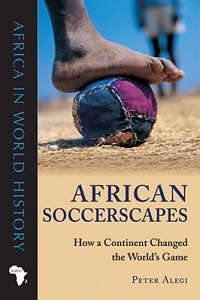
The 2010 Soccer World Cup is likely to be an economic loss for South Africa, given the enormous expenditure and costs involved, said Peter Alegi, an associate Professor of History and core faculty member of the African Studies Centre at Michigan State University, at a Rhodes University based seminar held this week.
The intangible or unquantifiable profits such as increased national pride as well as an improved name in the global arenas of tourism and investment may however be garnered, he pointed out.
The “monumental stadia” that we have constructed may be perceived as a positive image representing Africa’s technological advancement. There is an urgent need for South Africans to produce soccer culture and knowledge, he argued.
He notes that disproportionately few books on South African soccer are being written, and that we have perhaps missed an opportunity by neglecting to create a soccer museum.
Alegi highlighted the need for equitable access to professional soccer. Unlike PSL (Premier Soccer League) pricing, World Cup match ticket costs are far beyond ordinary working-class South Africans. Perhaps most vital is the need to implement soccer development plans at grassroots level that cater to boys and girls.
Alegi was speaking at the Rhodes Faculty of Humanities and the Harold Wolpe Memorial Trust East Cape Consortium insightful seminar entitled “African Soccerscapes: How a Continent Changed the World’s Game” that explored the history and the dynamics of the game of soccer from an African perspective.
Alegi’s accomplished perspective stems not only from many years of rigorous academic research but also from a great passion for the game of soccer. The primary themes he covered were the history of soccer in Africa with regard to race, nationhood and Pan-Africanism; the 2010 World Cup and the issue of commoditisation of soccer and its players.
The history of soccer in Africa is longer than that of the formalised game. Europeans originally brought the game to Africa and, seeing it as a way to “civilise” African people, missionaries and imperialists actively encouraged it.
During the period of colonial rule, oral literature and iimbongi or praise poets in particular were responsible for the spread of soccer culture.
Among Alegi’s many insights was that soccer tends to fuel the quest for political progress. He substantiated this by citing the example of the renowned FLN (National Liberation Front) team and its prominent role in the Algerian struggle for independence.
On the subject of nationhood Alegi pointed out that the current African state boundaries were arbitrarily demarcated by European colonists at the Berlin Conference of 1884, a process which left little room for the kind of social solidarity and ethnic cohesion which are conducive to national cultures.
It was largely through soccer that patriotic pride and state unity were fostered and expressed, he concluded.
